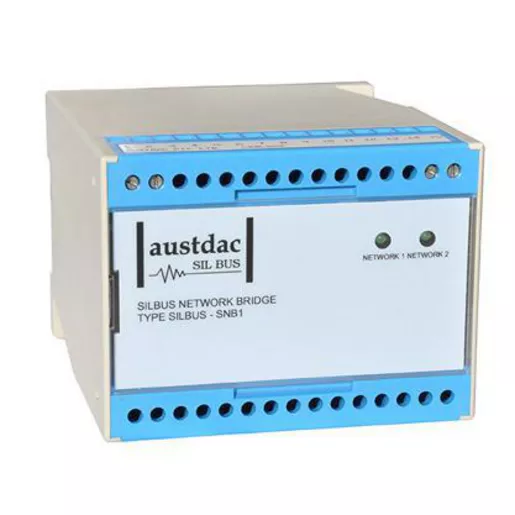Silbus Network Bridge - Austdac

Silbus Network Bridge - Austdac
Brand: Austdac
Catalog ID: SILBUS0180
The SILBUS network bridge type SILBUS-SNB1 is an explosion protected DIN railmounting module that allows for two SILBUS networks to exchange channel data or information but remain electrically independent or galvanically isolated from each other. The network bridge allows for the exchange of data on a single channel or on multiple channels. The exchange of data can be between channels of the same address or be mapped to be between different channels on each network. The data exchange can be uni or bi-directional. The network bridge is housed within a DIN rail mounting enclosure measuring 100mm (W) x 75mm (H) x 110mm (D). The front panel is located between the two top of enclosure mounted terminal blocks to provide a clear view of the operation indicating LED’s. Two LED’s, one for each network, are provided to indicate the status of the networks. The SILBUS-SNB1 does not require external power to operate; it draws its power from the connected SILBUS networks. The network bridge finds application in extending (doubling) the length of conveyor monitoring systems where power is not available along the length of the conveyor or in wide area gas monitoring systems with local area power tripping control. The SILBUS-SNB1 can be quickly and simply configured using a laptop computer running TeraTerm® or Hyper Terminal and a small plug in programming adaptor type MEAN1 connected to the network bridge configuration ports. The direction, source channel address and destination channel address can be configured for each data exchange function using the configuration ports. The network bridge also provides for the monitoring of the health of the two connected SILBUS networks in the form of two analogue values that can be seen and logged or trended by either or both network controllers. The channel addresses for the transmission of the two health signals are also configurable via the configuration ports. The network bridge can transfer standard digital channels, ANALINK, FASTLINK and DATALINK data. Safety type channels are not copied by the network bridge.
Silbus Network Monitor - Austdac
Silbus BridgeBridge between networks
General
Catalog Number
SILBUS0180